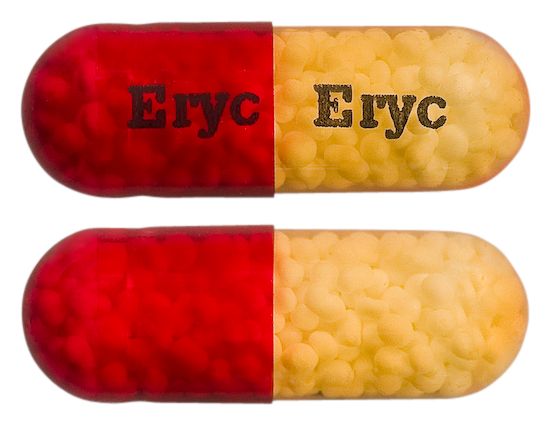Erythromycin (Mayne Pharma) TM
Listen to the Pronunciation:
You should seek medical advice in relation to medicines and use only as directed by a healthcare professional. Always read the label. If symptoms persist see your healthcare professional.
Active ingredients: erythromycin
Pack: Erythromycin (Mayne Pharma) 250 mg enteric capsule, 25, bottle
Brand name
(ARTG)
: MAYNE PHARMA ERYTHROMYCIN erythromycin 250mg capsule bottleConsumer Medicine Information (CMI)
Read the CMI leaflet for facts you need to know before, during and after taking your medicine.
For more information about CMIs and how to read them, please visit How to read Consumer Medicine Information (CMI).
What this medicine is used for
(ARTG)
MAYNE PHARMA ERYTHROMYCIN is indicated in children and adults for the treatment of the following conditions: Upper respiratory tract infections of mild to moderate degree caused by Streptococcus pyogenes (group A beta haemolytic streptococci), Streptococcus pneumoniae (Diplococcus pneumoniae). Lower respiratory tract infections of mild to moderate severity caused by Streptococcus pyogenes (group A beta hemolytic streptococci), Streptococcus pneumoniae (Diplococcus pneumoniae), acute and chronic bronchitis, pneumonia. Sinusitis caused by Streptococcus pneumoniae, Streptococcus pyogenes. Otitis media due to Streptococcus pneumoniae, Streptococcus pyogenes. Respiratory tract infections due to Mycoplasma pneumonia (Eaton's agent). Skin, and skin structure infections of mild to moderate severity caused by Streptococcus pyogenes and Staphylococcus aureus (resistant staphylococci may emerge during treatment). Bordetella pertussis: Erythromycin produces early elimination of the causative organism from the nasopharynx although the clinical course of the disease is not altered; therapeutic doses should be continued for at least 10 days. Diphtheria: As an adjunct to antitoxin infections due to Corynebacterium diphtheriae, to prevent establishment of carriers and to eradicate the organism in carriers. Erythrasma: In the treatment of infections due to Corynebacterium minutissimum. Infections due to Listera monocytogenes. Non-gonococcal Urethritis: Chlamydia trachomatis and Ureaplasma urealyticum have been shown to be sensitive to erythromycin and clinical studies have demonstrated its efficacy in urethritis due to these organisms. A minimum of 10 days therapy appears to be required. Chlamydia trachomatis infection (excluding Non-gonococcal urethritis): Erythromycin has been shown to be effective in the treatment of trachoma or inclusion-body conjunctivitis and pneumonia in infants caused by Chlamydia trachomatis. Campylobacter fetus (subspecies) jejuni: Infections due to this organism when antibiotic therapy is indicated. Primary syphilis caused by Treponema pallidum: Erythromycin (oral forms only) is an alternative choice of treatment for primary syphilis in patients allergic to the penicillins. In the treatment of primary syphilis, spinal fluid should be examined before treatment and as part of the followup after therapy. Legionnaires' disease caused by Legionella pneumophila: Although no controlled clinical efficacy studies have been conducted, in vitro and limited preliminary clinical data suggest that erythromycin may be effective in treating Legionnaires' Disease. Prevention of initial attacks of rheumatic fever: Penicillin is considered by the American Heart Association to be the drug of choice in the prevention of initial attacks of rheumatic fever (treatment of group A beta - haemolytic streptococcal infections of the upper respiratory tract e.g. tonsillitis or pharyngitis). Erythromycin is indicated for the treatment of penicillin allergic patients. A therapeutic dose should be administered for 10 days. Prevention of Recurrent Attacks of Rheumatic Fever: Penicillin or sulphonamides are considered by the American Heart Association to be the drugs of choice in the prevention of recurrent attacks of rheumatic fever. In patients who are allergic to penicillin and sulphonamides, oral erythromycin is recommended by the American Heart Association in the long term prophylaxis of streptococcal pharyngitis (for the prevention of recurrent attacks of rheumatic fever). Prevention of bacterial endocarditis: Although no controlled clinical efficacy trials have been conducted, oral erythromycin has been suggested by the American Heart Association and the American Dental Association in a regimen for prophylaxis against bacterial endocarditis in patients sensitive to penicillin who have congenital heart disease, or rheumatic or other acquired valvular heart disease when they undergo dental or surgical procedures of the upper respiratory tract. Erythromycin is not suitable prior to genitourinary or gastrointestinal tract surgery.
How to use this medicine
(ARTG)
This medicine contains one component only.
Component :
- Capsule, enteric
- Oral
- a red/yellow gelatin capsule printed Eryc in black, filled with white spheroidal pellets
Images

Images © Medicines Information Pty Ltd.
Storage conditions
(ARTG)
- Store below 25 degrees Celsius
- Shelf lifetime is 18 Months.
Do I need a prescription ?
(ARTG)
These medicine packs are available from a pharmacist and requires a prescription. It is
- 25 pack
Is this medicine subsidised ?
(PBS)
This medicine was verified as being available on the PBS (Pharmaceutical Benefits Scheme) on January, 6 2026. To learn more about this subsidy, visit the Pharmaceutical Benefits Scheme (PBS) website.
Pregnant or planning a pregnancy ?
(AHT)
For the active ingredient erythromycin
This medicine is generally considered safe during pregnancy if taken as directed. During pregnancy, you should discuss your medicine use with your doctor or pharmacist.
Reporting side effects
You can help ensure medicines are safe by reporting the side effects you experience.
You can report side effects to your doctor, or directly at www.tga.gov.au/reporting-problems









